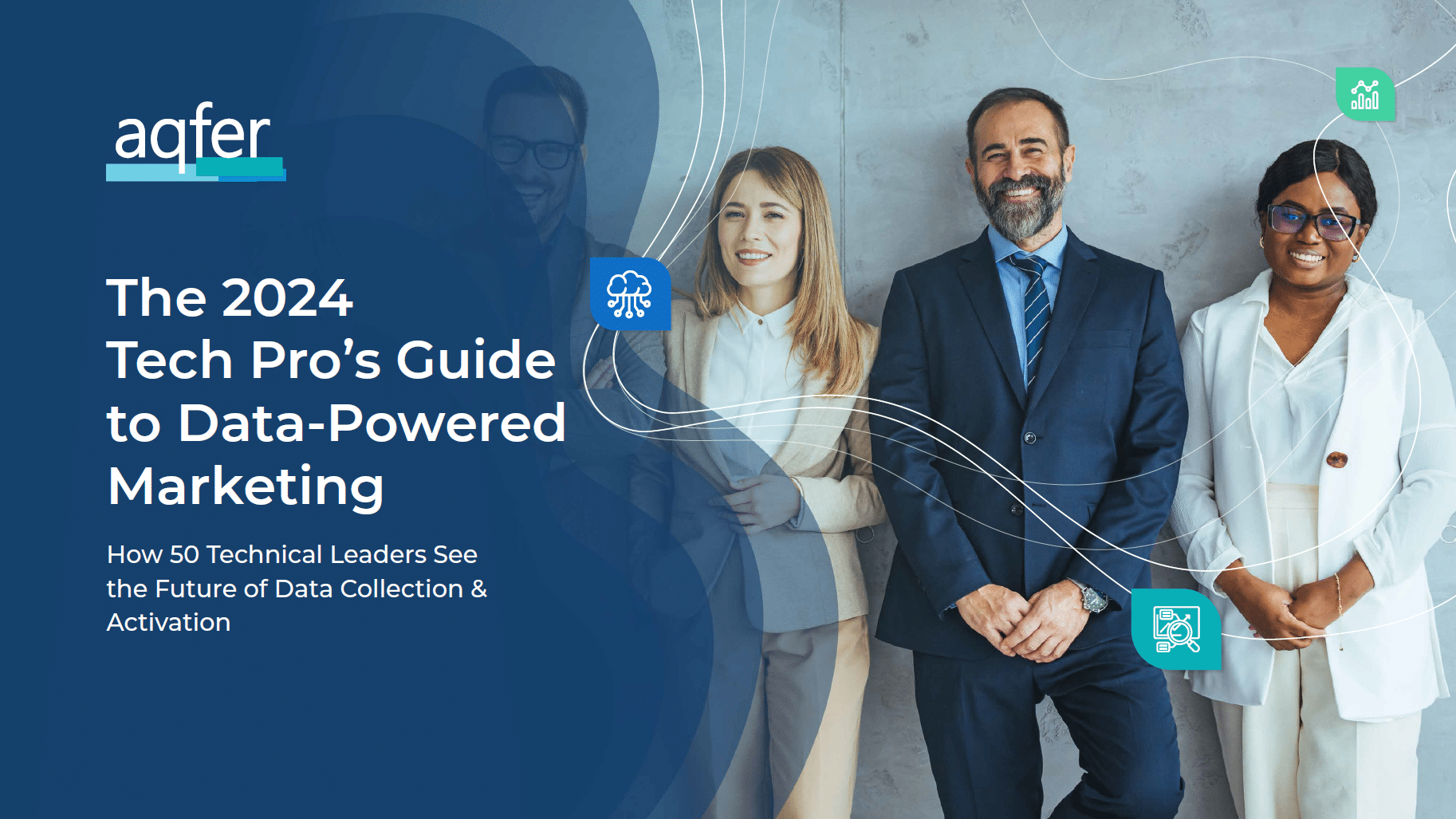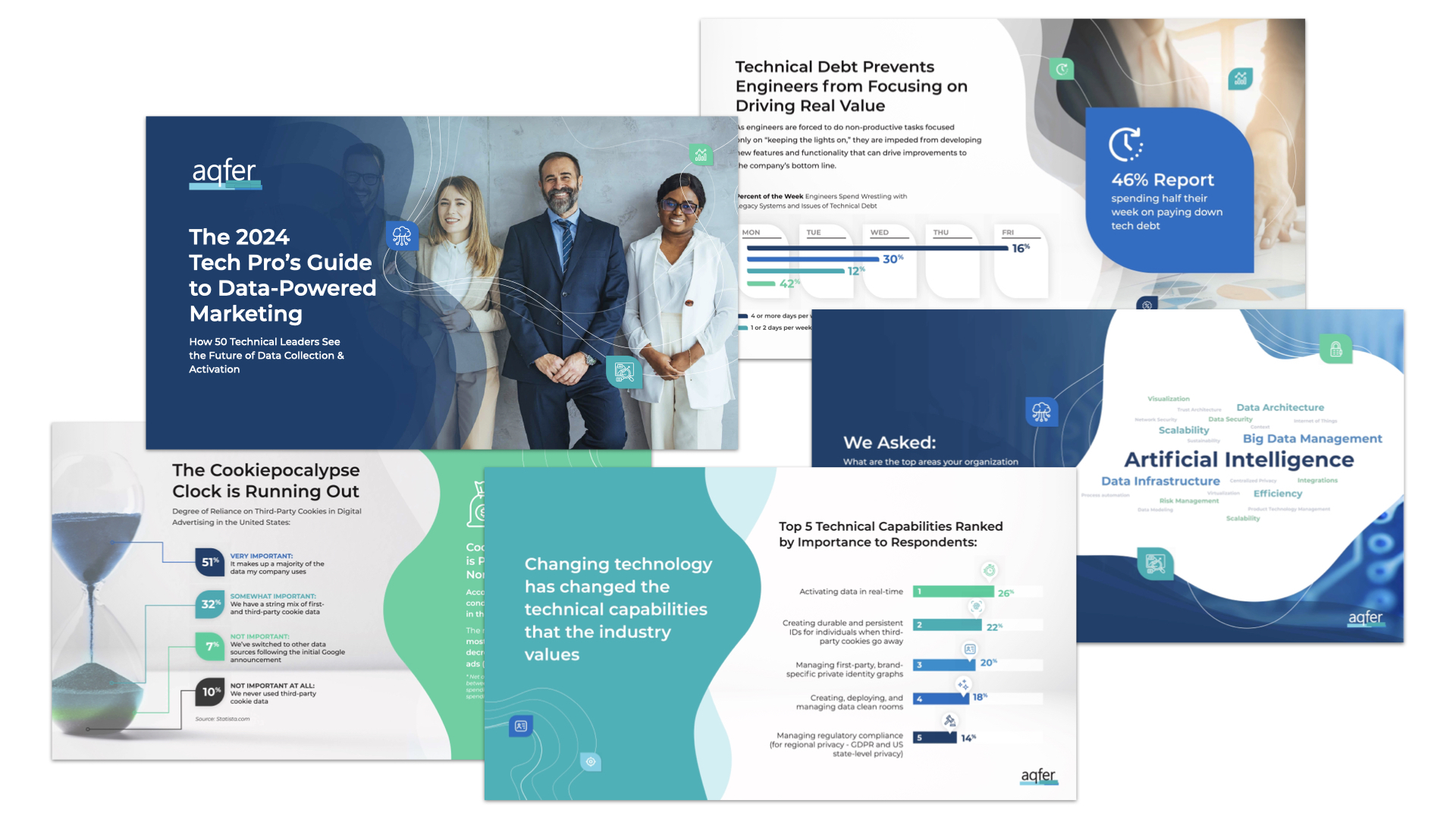As the third-party cookie apocalypse looms, technology leaders have already started implementing first-party data strategies. While techniques for collecting and activating first-party data may vary, one thing is certain: data-powered marketing is changing – for good.
To better understand this rapidly evolving landscape, we teamed up with researchers at JBF Research to interview senior technology leaders from MarTech and AdTech companies. We asked them to weigh in on their company’s preparedness for a world without third-party cookies and to assess top priorities for data collection and activation.
The 2024 Tech Pro’s Guide to Data-Powered Marketing
While we gathered tons of helpful feedback on the future of data collection and activation for MSPs, one thing is clear: Our technology landscape is growing ever more complex and crowded. An organization’s ability to ingest, organize and act on large data sets will be critical to success in a crowded competitive environment.
Read on to explore some perspectives on the future of data-powered marketing, or, click here to download the 21-page white paper titled The 2024 Tech Pro’s Guide to Data-Powered Marketing.
MSPs are Drowning in Data but Starving for Knowledge
The technology leaders we surveyed all shared a common perspective: data – especially at scale – is difficult to process. Many organizations have the ability to collect more data than ever before. Yet, their ability to extract value and act on it hasn’t grown exponentially over the past few years.
Real-time data activation was reported as the #1 technical capability that leaders are working towards in 2023 and into 2024. But there are a ton of hurdles standing in the way. 70% of survey respondents find organizing data for analytics and marketing to be time-consuming and difficult. One of the biggest hurdles hindering growth is technical debt. Nearly 60% of the organizations we spoke with report spending 1 or more days per week per employee retiring technical debt.
If You Don’t Feel Prepared for The Cookiepocolypse, You Aren’t Alone
Currently, many MSPs rely on third-party cookies. They use third-party data to enhance first-party data sets. There’s also a heavy reliance on third-party cookies to activate data for use across marketing channels. In fact, 51% say third-party cookies are very important, and that third-party data accounts for a majority of their company’s data intelligence.
50% of organizations surveyed say their own company will be seriously affected when Chrome bans cookies. And they believe that their peers and competitors are better prepared for the Cookiepocolypse than their organization.
Data Privacy and Sharing are Critical Technology Investments
These days, you can hardly open LinkedIn without seeing headlines about multi-million and even billion-dollar fines associated with data security non-compliance. Security violation penalties are higher than they’ve ever been and tolerance for infractions has diminished in recent years.
Our study found that 43% of organizations cite data privacy/compliance as a top concern. One key investment area, outside of tighter privacy and compliance frameworks is in data clean room technology. Data clean rooms help make data sharing more seamless– and more compliant. 83% of respondents agreed that it is critically important to have a clean room that can ingest data from any platform in order to meet the needs of advertisers, publishers, and industry partners. But just having a data clean room isn’t enough. Interoperability – meaning it works regardless of where data is stored – is an important piece of the data clean room capability.
AI Adds Stress and Urgency to a Crowded MSP Landscape
Speaking of media (and possibly world) domination, AI just might be the buzzword of 2023. Our study uncovered a few areas where marketers are looking for more robust AI technology, including email marketing, advertising, and data analysis. These are capabilities that MSPs are looking to improve over the coming years, but it’s not as simple as adding new features to the roadmap.
AI and large data set activation are interwoven. Philip Russom of the Data Warehousing Institute recently shared requirements for machine learning, noting: “The development of a machine learning algorithm depends on large volumes of data, from which the learning process draws many entities, relationships, and clusters.” While many organizations would love to get ahead of the AL/ML curve, they still have groundwork to lay in order to collect and activate data at a scale that can power those initiatives.
Download Your Free Copy of The Research
Our research revealed that large data-set analysis and activation is the gateway to the robust technology advances that modern marketing requires, and modern brands crave. Technology leaders don’t feel confident in their ability to activate large data sets efficiently, and thus, their ability to stay ahead of their competition feels tenuous at best.
This post has barely scratched the surface of the insights we uncovered in our study. Download the 21-page report to learn more about what’s top of mind for technology leaders, including technical challenges and priorities for the coming year.



